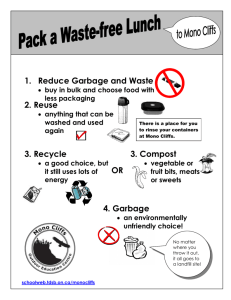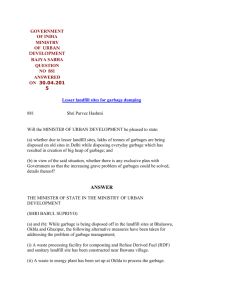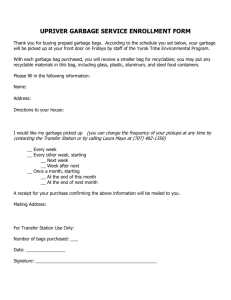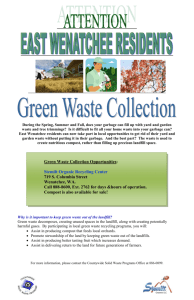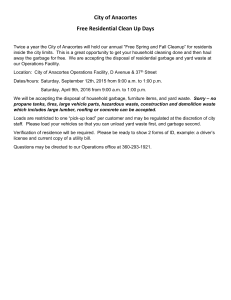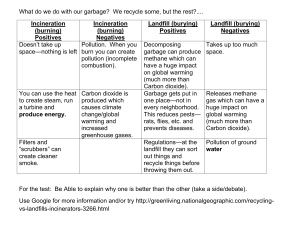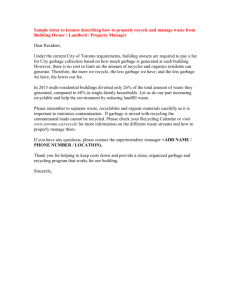11.4.6
advertisement
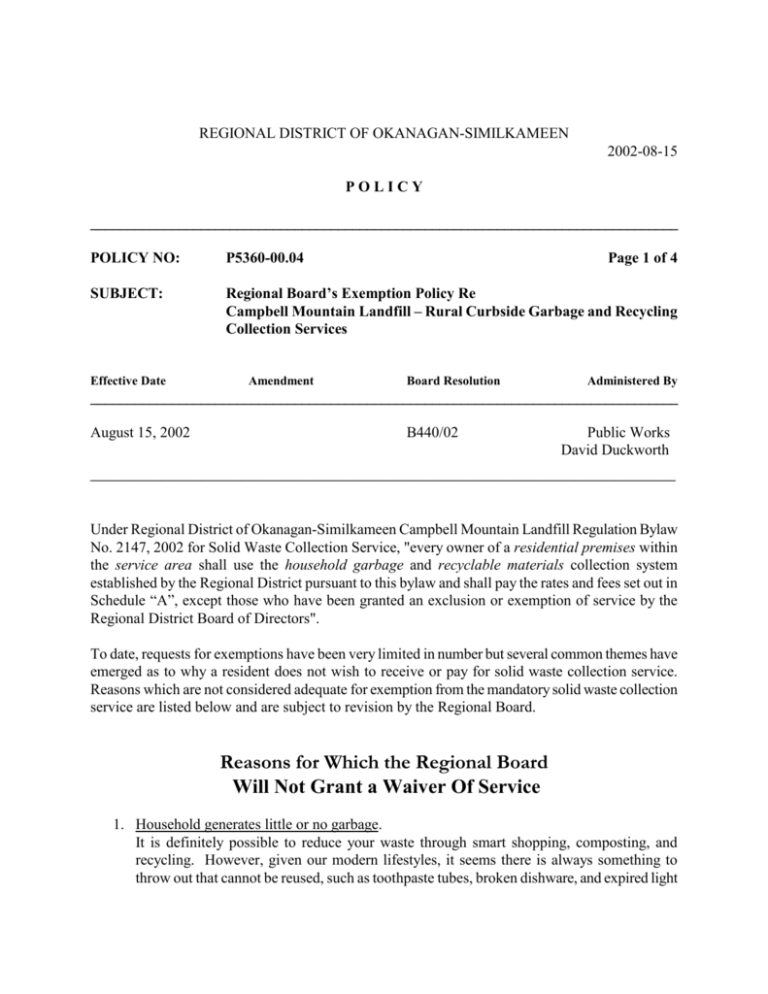
REGIONAL DISTRICT OF OKANAGAN-SIMILKAMEEN 2002-08-15 POLICY _________________________________________________________________________________ POLICY NO: P5360-00.04 SUBJECT: Regional Board’s Exemption Policy Re Campbell Mountain Landfill – Rural Curbside Garbage and Recycling Collection Services Effective Date Amendment Page 1 of 4 Board Resolution Administered By _________________________________________________________________________________ August 15, 2002 B440/02 Public Works David Duckworth __________________________________________________________ Under Regional District of Okanagan-Similkameen Campbell Mountain Landfill Regulation Bylaw No. 2147, 2002 for Solid Waste Collection Service, "every owner of a residential premises within the service area shall use the household garbage and recyclable materials collection system established by the Regional District pursuant to this bylaw and shall pay the rates and fees set out in Schedule “A”, except those who have been granted an exclusion or exemption of service by the Regional District Board of Directors". To date, requests for exemptions have been very limited in number but several common themes have emerged as to why a resident does not wish to receive or pay for solid waste collection service. Reasons which are not considered adequate for exemption from the mandatory solid waste collection service are listed below and are subject to revision by the Regional Board. Reasons for Which the Regional Board Will Not Grant a Waiver Of Service 1. Household generates little or no garbage. It is definitely possible to reduce your waste through smart shopping, composting, and recycling. However, given our modern lifestyles, it seems there is always something to throw out that cannot be reused, such as toothpaste tubes, broken dishware, and expired light bulbs. Some items cannot be recycled locally and are part of the unavoidable packaging we buy with everyday products, such as peanut butter jars, plastic film wrap, and waxed milk cartons. These items need a proper method of disposal, which means they must somehow get to a local landfill. Without a mandatory service, the Regional District has no way to verify that this will happen. Residents must also realize that most of the collection service costs are incurred by driving the collection route, not by stopping at a specific house to pick up a varying number of garbage containers. Furthermore, one must be aware of the social, legal and environmental benefits of the service such as tidier streets, less traffic, increased responsibility in the management of household garbage, and achievement of waste reduction goals. These benefits outweigh concerns about variations in the level of use. 2. Residents are away from home for extended periods of time because of job requirements, vacation, alternate winter residence. This service is similar to others such as sewer, library, and water which have fixed operating costs all year round. Most of the collection service costs are incurred by driving the garbage collection route, not by stopping at a specific house to pick up a varying number of garbage containers. Social, legal, and environmental benefits of the service such as tidier streets, less traffic, increased responsibility in the management of household garbage, and achievement of waste reduction goals outweigh concerns about variations in the level of use. Furthermore, occupancy of a dwelling cannot be monitored to ensure abuse of an exemption is not taking place. 3. Property is a recreational home and is only occupied during the summer. This service is similar to others such as sewer, library, and water which have fixed operating costs all year round. Most of the collection service costs are incurred by driving the garbage collection route, not by stopping at a specific house to pick up a varying number of garbage containers. Social, legal, and environmental benefits of the service such as tidier streets, less traffic, increased responsibility in the management of household garbage, and achievement of waste reduction goals outweigh concerns about variations in the level of use. Furthermore, occupancy of a dwelling cannot be monitored to ensure abuse of an exemption is not taking place. 4. Resident prefers to pay private hauler and have a more flexible service. Since the Regional District contractor will be driving past this home anyway, there is no need to increase truck traffic in a residential neighbourhood. The costs of the program can only be minimized and stabilized if everyone contributes. Private haulers are not working towards waste reduction goals and therefore have no interest in limiting or monitoring quantities of waste picked up. This will not be an affordable option due to market conditions resulting from a majority of households being on a separate collection contract. 5. Property is not easily accessible and owner does not want to bring garbage to a common area for collection. Property owners must accept the consequences of choosing a particular location for their home and are solely responsible for making their property accessible. Higher levels of service may be available at some point in the future if a sufficient number of residential premises request such service. Residential premises requesting a higher level of service would likely pay an additional fee that the Contractor may charge. It is also nearly impossible to administer an exemption based on this reason and to verify that the objectives of the garbage collection program are being met. It will reduce vehicle traffic and air pollution even if residents drive their garbage to a public roadway instead of the entire distance to the landfill. 6. Resident prefers to go to the landfill directly Taking garbage directly to the Campbell Mountain Sanitary Landfill is allowable, but a tipping fee is paid at the site. At the Campbell Mountain Sanitary Landfill, the minimum charge for garbage is currently $5.00. This provides a monetary incentive to reduce garbage but does not meet other objectives of the garbage collection program, such as reducing vehicle traffic associated with garbage disposal and providing a strong correlation between the cost of garbage disposal and the amount of waste being disposed. At $125.00 per annum, the residential premises solid waste collection service is less expensive than 26 trips to the landfill, without even factoring in private vehicle operating costs and the value of the driver's time. As well, there is no way of verifying that household garbage and recyclable materials not collected as part of the regular service is actually going to the landfill and not being disposed of illegally at a different location. 7. Resident prefers to take garbage to the dumpster at work. Taking garbage to a commercial bin is unacceptable for many reasons. Most significantly, this method of disposal subverts the Regional District's ability to monitor and discourage the creation of garbage in favour of the goals of the Regional Solid Waste Management Plan. There is no direct cost incentive to reduce waste going into a commercial bin, unless you happen to be the owner or renter of that bin. Many business owners and hauling companies have resorted to locking up their bins in order to avoid paying for extra garbage placed there by residents who are not using the traditional residential garbage collection programs. Since the Regional District cannot possibly enforce or verify the legitimacy of residential waste in commercial bins, this means of garbage disposal cannot be considered as a reason for exemption. 8. Resident is on a fixed or low income. Solid waste collection service is not different from any other mandatory municipal, regional and provincial services. Furthermore, regardless of income, waste is still being generated and must get to a local landfill. In many cases, the new service is significantly cheaper than previous options, such as a private hauling service or direct trips to the landfill. 9. Resident has a physical inability to get garbage to the curb. In most cases the garbage leaves the house by the same manner in which it got inside through the help of neighbours, friends, or relatives. Higher levels of service and special consideration may be available for extreme cases but there have been no requests for this type of special service to date. 10. Resident is burning or burying waste on property. Burning or burying waste on private property is not an acceptable long-term solution for managing waste. Smoke from open burning has become a significant environmental problem in British Columbia, threatening health and reducing visibility. Under the Provincial Open Burning Smoke Control Regulation, domestic waste and plastics are a prohibited material for burning, even if a permit from the Ministry of Forests or the applicable Fire Department has been granted. Burying waste requires special approval from the Ministry of Water, Land and Air Protection. \\RDOSDATA\DATA\EXEMPT\RDOS Board Policies & Procedures\Board Policies\P5360-00.04CML - Rural Curbisde Garbage RecyclingPolicyAug15, 2002.doc .
